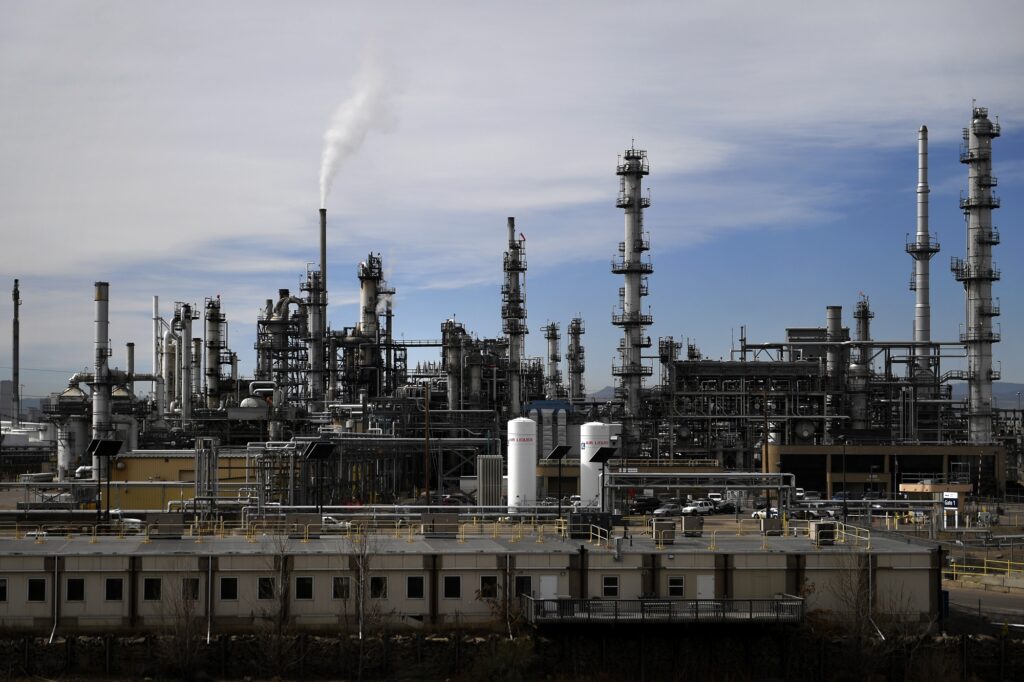Suncor must pay a record $11 Million fine for air pollution violations at Colorado refinery

- Colorado announces largest state enforcement package against a single facility for air pollution violations to Suncor refinery in Commerce City
- Separate action finalizes Suncor’s fenceline monitoring plan, doubling required air monitors
The Colorado Department of Public Health and Environment is announcing the following actions involving Suncor refinery in Commerce City:
- Suncor must pay at least $10.5 million toward penalties and projects as a result of air pollution violations from July 2019 through June 2021. This action holds Suncor accountable for past violations and requires the refinery to take steps to prevent future violations.
- In a separate action, the department today ensured more data and transparency in Suncor’s air pollution monitoring around the facility’s fenceline. Suncor must double the number of air pollution monitors compared to the refinery’s original fenceline monitoring plan.
Both actions build on the department’s ongoing work to protect clean air for all, ensure accountability and compliance with air regulations, and keep local communities informed.
“This historic enforcement package, which includes both a penalty and required facility improvement projects, is the largest our agency has ever reached for a single facility for air pollution. Today’s actions demonstrate our unwavering commitment to environmental protection and the health of our residents. The agency will continue to use every tool available to prevent Suncor from having future violations,” said Executive Director Jill Hunsaker Ryan, Colorado Department of Public Health and Environment.
“The communities that live and work near Suncor have experienced unfair air pollution burdens from the refinery’s permit violations for too long,” said the department’s Director of Environmental Health and Protection Trisha Oeth. “We are committed to protecting people’s health and wellbeing – and today’s actions show we mean it. These penalties, projects, and enhanced air monitoring ensure Suncor’s neighbors can breathe easier and the refinery takes future compliance seriously.”
“Colorado continues to hold air pollution sources accountable when they violate the law,” said the department’s Air Pollution Control Division Director Michael Ogletree. “These historic actions not only address impacts of past violations – they aim to reduce environmental injustices in the local community. There are real consequences for air pollution violations – whether they be from Suncor or any other air pollution source in Colorado. Today’s actions demonstrate that compliance with clean air laws is not optional.”
$10.5 million package
The state enforcement package is the largest that Colorado has ever reached against a single facility for air pollution violations. In total, Suncor must put at least $10.5 million towards penalties and improvement projects.
RELATED ARTICLE: World Bank’s New Bond Initiative Aims to Tackle Global Plastic Pollution
The total penalties in the enforcement package amount to $2.5 million. Of this amount, about $1.3 million will fund projects to benefit disproportionately impacted communities through the state’s environmental justice grant program, and about 40% will go toward the state’s general fund. A small portion will go to the U.S. Environmental Protection Agency as required by a previous joint U.S. EPA/Colorado enforcement action.
No less than $8 million will go toward projects Suncor must complete. This work aims to minimize excess air pollution from recurring due to power-related causes.
Many of Suncor’s violations were associated with power disruptions. The enforcement package addresses air pollution violations between July 2019 and June 2021. The violations included:
- Exceeding sulfur dioxide, carbon monoxide, and nitrogen oxides emissions limits.
- Exceeding hydrogen sulfide concentration limits.
- Exceeding opacity and visible emissions standards.
- Failing to meet certain operating parameters.
- Violations due to causes other than power disruptions.
Fenceline monitoring plan
Suncor is one of four Colorado facilities required to conduct fenceline monitoring under the state’s 2021 Air Toxics Act. Fenceline monitoring involves setting up and running air measurement equipment around the perimeter of a facility. The final fenceline monitoring plan includes double the number of air monitors compared to what Suncor submitted. The final plan ensures the monitoring will meet the state law’s requirement for continuous air monitoring and data sharing in near real-time.
Colorado has also required Suncor to monitor and report on more air toxics than required by state law. State statute requires monitoring for hydrogen cyanide, hydrogen sulfide, and benzene. Suncor must also monitor and report for toluene, ethylbenzene, and xylenes when it implements the new fenceline monitoring plan.
State statute requires Suncor to send emergency alerts based on its fenceline monitoring system’s measurements. To keep community members informed, the final plan achieved a more protective threshold for sending alerts compared to what Suncor originally proposed. Suncor proposed sending emergency alerts if the amount of an air pollutant exceeds the U.S. EPA’s acute exposure guideline level one threshold for one-hour of exposure. The final threshold is based on a four-hour time period, which is more protective of public health.








